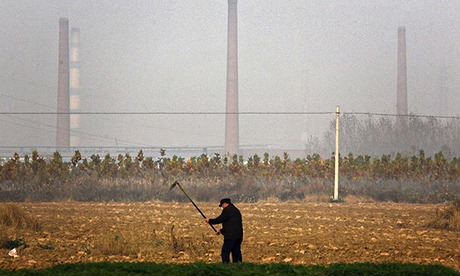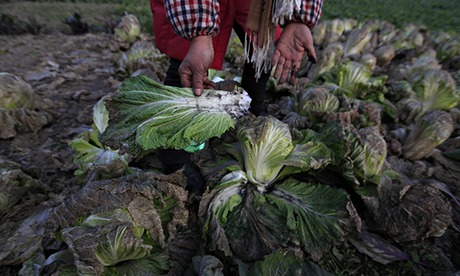by Jonathan Kaiman, reporting from Beijing for the Guardian:
Chinese scientists have warned that the country’s toxic air pollution is now so bad that it resembles a nuclear winter, slowing photosynthesis in plants – and potentially wreaking havoc on the country’s food supply.
Beijing and broad swaths of six northern provinces have spent the past week blanketed in a dense pea-soup smog that is not expected to abate until Thursday. Beijing’s concentration of PM 2.5 particles – those small enough to penetrate deep into the lungs and enter the bloodstream – hit 505 micrograms per cubic metre on Tuesday night. The World Health Organisation recommends a safe level of 25.
The worsening air pollution has already exacted a significant economic toll, grounding flights, closing highways and keeping tourists at home. On Monday 11,200 people visited Beijing’s Forbidden City, about a quarter of the site’s average daily draw.
He Dongxian, an associate professor at China Agricultural University‘s College of Water Resources and Civil Engineering, said new research suggested that if the smog persists, Chinese agriculture will suffer conditions “somewhat similar to a nuclear winter”.
She has demonstrated that air pollutants adhere to greenhouse surfaces, cutting the amount of light inside by about 50% and severely impeding photosynthesis, the process by which plants convert light into life-sustaining chemical energy.
She tested the hypothesis by growing one group of chilli and tomato seeds under artificial lab light, and another under a suburban Beijing greenhouse. In the lab, the seeds sprouted in 20 days; in the greenhouse, they took more than two months. “They will be lucky to live at all,” He told the South China Morning Post newspaper.
She warned that if smoggy conditions persist, the country’s agricultural production could be seriously affected. “Now almost every farm is caught in a smog panic,” she said.

A farmer turns soil to plant crops near a state-owned lead smelter in Tianying that has made much of the land uninhabitable. (David Gray/Reuters/Corbis)
Early this month the Shanghai Academy of Social Sciences claimed in a report that Beijing’s pollution made the city almost “uninhabitable for human beings“.
The Chinese government has repeatedly promised to address the problem, but enforcement remains patchy. In October, Beijing introduced a system of emergency measures if pollution levels remained hazardous for three days in a row, including closing schools, shutting some factories, and restricting the use of government cars.
According to China’s state newswire Xinhua, 147 industrial companies in Beijing have cut or suspended production. Yet schools remained open and government cars remained on the road.
One person not put off by the smog was President Xi Jinping, who braved the pollution to make an unannounced visit to a trendy neighbourhood popular with tourists.
Dressed in a black jacket and trousers – and no facemask – Xi made a brief walkabout in Nanluoguxiang district last Thursday morning. The visit prompted approving coverage in Chinese news reports, but also mockery on social media sites. “Xi Jinping visits Beijing’s Nanluoguxiang amid the smog: breathing together, sharing the fate,” said a Xinhua headline.
Photos and shaky video footage apparently of Xi’s visit ricocheted around Chinese social media sites. “Why isn’t he wearing a facemask?” asked one Sina Weibo user. “Isn’t it bad for his health?”
This week Chinese media reported that a man in Shijiazhuang, the capital of Hebei province near Beijing, had sued the local environmental protection bureau for failing to rein in the smog. Li Guixin filed the lawsuit asking the municipal environment protection bureau “perform its duty to control air pollution according to the law”, the Yanzhao Metropolis Daily reported.
Li is also seeking compensation for the pollution. “Besides the threat to our health, we’ve also suffered economic losses, and these losses should be borne by the government and the environmental departments because the government is the recipient of corporate taxes, it is a beneficiary,” he told the Yanzhao Metropolis Daily.
Li’s lawyer, Wu Yufen, confirmed the lawsuit but refused to comment because of the sensitivity of the case. He said: “This is the first ever case of a citizen suing the government regarding the issue of air pollution. We’re waiting for the judicial authority’s response.”

Diseased vegetables said to be caused by pollution from a chemical plant. (How Hwee Young/EPA)
Li told the newspaper that he had bought an air purifier, masks and a treadmill, but none had helped him to overcome the pernicious health effects of the smog. He is seeking RMB 10,000 (£1,000) in compensation. “I want show every citizen that we are real victims of this polluted air, which hurts us both from a health perspective and economically,” he said.
Li Yan, a climate and energy expert at Greenpeace East Asia, said the case could bring exposure to polluted cities outside of Beijing, putting pressure on provincial officials to prioritise the problem. She said: “People … who live in Beijing are suffering from the polluted air, but we have the attention of both domestic and international media. Shijiazhuang’s environmental problems are far more serious, and this case could bring Shijiazhuang the attention it has deserved for a long time.”
25 Feb 2014